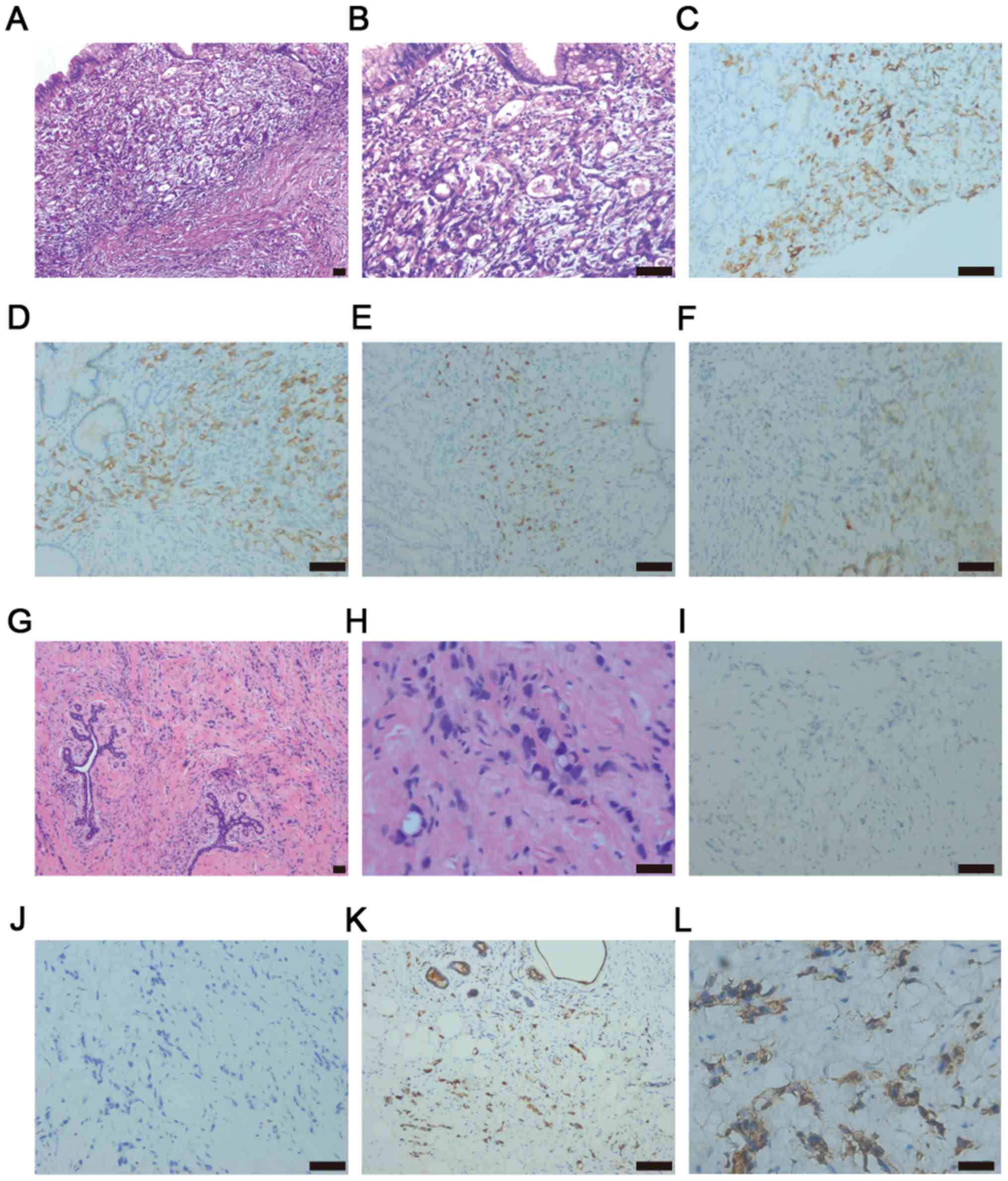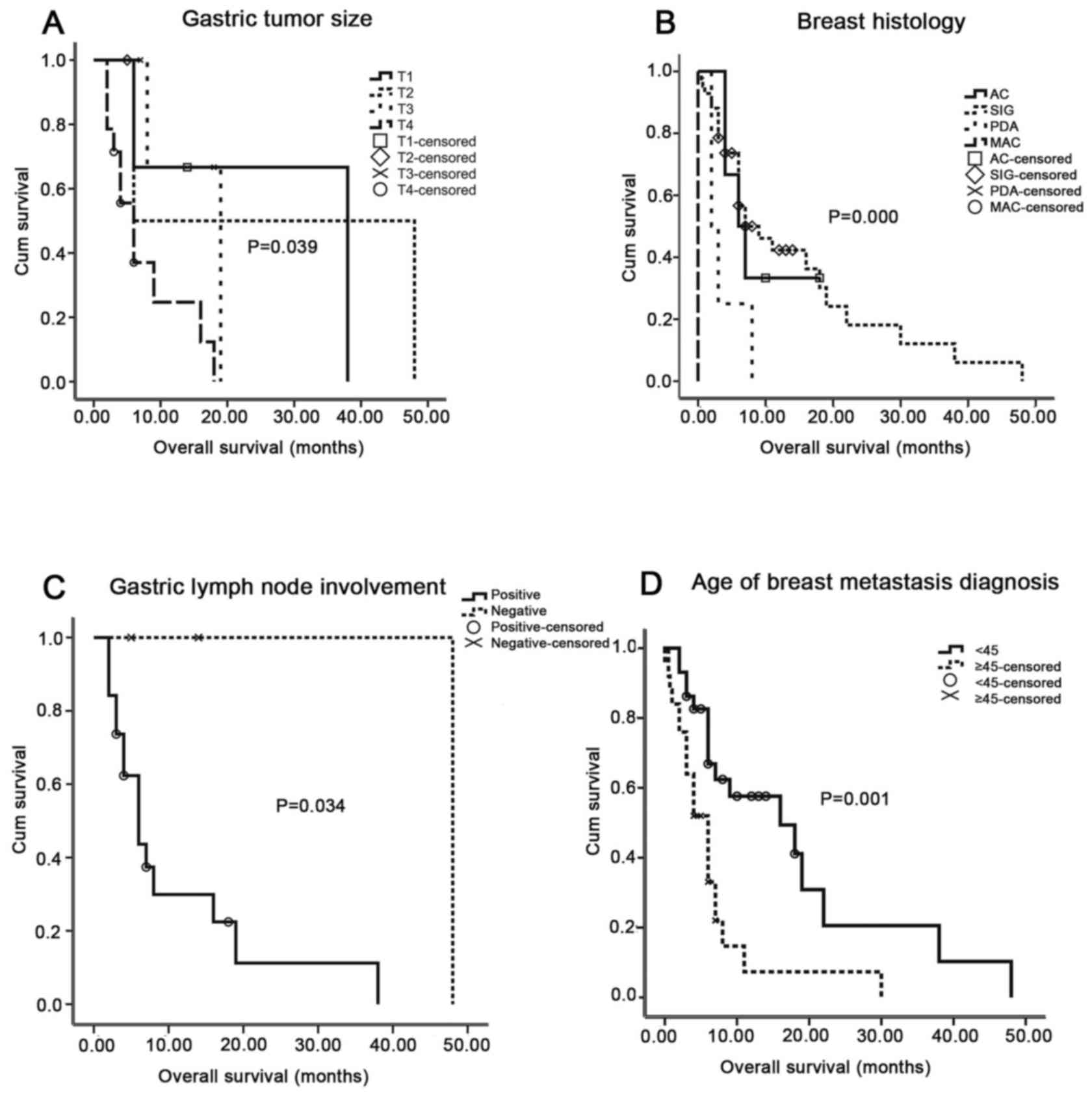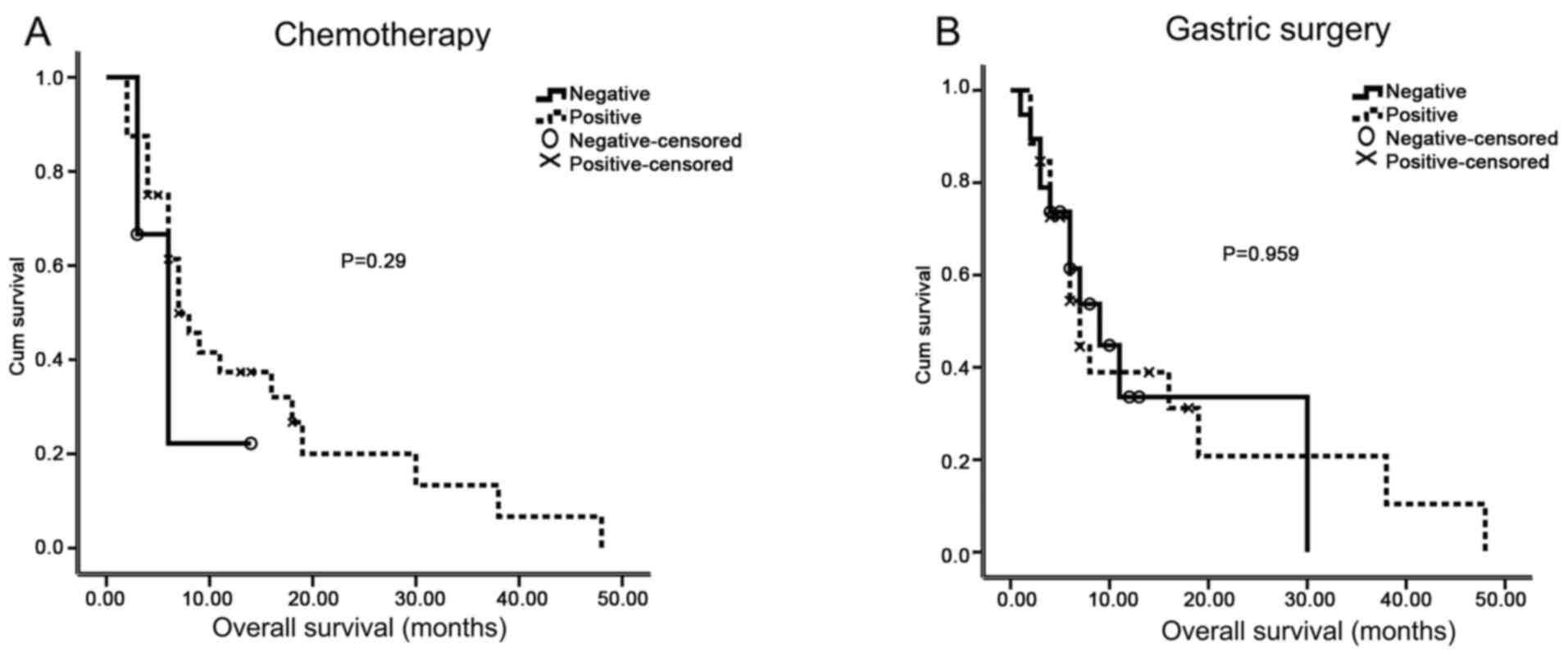|
1
|
Siegel RL, Miller KD and Jemal A: Cancer
statistics, 2015. CA Cancer J Clin. 65:5–29. 2015. View Article : Google Scholar : PubMed/NCBI
|
|
2
|
Lee SK, Kim WW, Kim SH, Hur SM, Kim S,
Choi JH, Cho EY, Han SY, Hahn BK, Choe JH, et al: Characteristics
of metastasis in the breast from extramammary malignancies. J Surg
Oncol. 101:137–140. 2010. View Article : Google Scholar : PubMed/NCBI
|
|
3
|
Domanski HA and Mas-Morillas A: Breast
metastases from pancreatic and ovarian carcinoma. Diagn Cytopathol.
21:154–155. 1999. View Article : Google Scholar : PubMed/NCBI
|
|
4
|
Gupta S, Gupta MK, Gupta R and Mishra RS:
Breast metastasis of cervical carcinoma diagnosed by fine needle
aspiration cytology. A case report. Acta Cytol. 42:959–962. 1998.
View Article : Google Scholar : PubMed/NCBI
|
|
5
|
Heggarty P, McCusker G and Clements WD:
Bilateral breast metastases from a renal carcinoma. Int J Clin
Pract. 52:443–444. 1998.PubMed/NCBI
|
|
6
|
Kayikçioğlu F, Boran N, Ayhan A and Güler
N: Inflammatory breast metastases of ovarian cancer: A case report.
Gynecol Oncol. 83:613–616. 2001. View Article : Google Scholar : PubMed/NCBI
|
|
7
|
Adamovich TL and Simmons RM: Ductal
carcinoma in situ with microinvasion. Am J Surg. 186:112–116. 2003.
View Article : Google Scholar : PubMed/NCBI
|
|
8
|
Torre LA, Bray F, Siegel RL, Ferlay J,
Lortet-Tieulent J and Jemal A: Global cancer statistics, 2012. CA
Cancer J Clin. 65:87–108. 2015. View Article : Google Scholar : PubMed/NCBI
|
|
9
|
Iesato A, Oba T, Ono M, Hanamura T,
Watanabe T, Ito T, Kanai T, Maeno K, Ishizaka K, Kitabatake H, et
al: Breast metastases of gastric signet-ring cell carcinoma: A
report of two cases and review of the literature. Onco Targets
Therapy. 8:91–97. 2015.
|
|
10
|
Kwak JY, Kim EK and Oh KK: Radiologic
findings of metastatic signet ring cell carcinoma to the breast
from stomach. Yonsei Med J. 41:669–672. 2000. View Article : Google Scholar : PubMed/NCBI
|
|
11
|
Otsuji E, Yamaguchi T, Sawai K and
Takahashi T: Characterization of signet ring cell carcinoma of the
stomach. J Surg Oncol. 67:216–220. 1998. View Article : Google Scholar : PubMed/NCBI
|
|
12
|
Hasegawa S, Yoshikawa T, Yoshida T,
Osaragi T, Cho H, Tsuburaya A, Kobayashi O and Sairenji M: A case
of breast metastasis of gastric cancer. Gan to Kagaku Ryoho.
34:1115–1118. 2007.(In Japanese). PubMed/NCBI
|
|
13
|
Soler Parrell C, Palacios Marqués A, Saco
López L, De Las Heras Bermejo R and Martínez Pertusa S: Breast
metastatic localization of signet-ring cell gastric carcinoma. ISRN
Obstet Gynecol. 2011:4261502011.PubMed/NCBI
|
|
14
|
Christophorou MA, Ringshausen I, Finch AJ,
Swigart LB and Evan GI: The pathological response to DNA damage
does not contribute to p53-mediated tumour suppression. Nature.
443:214–217. 2006. View Article : Google Scholar : PubMed/NCBI
|
|
15
|
Matsuoka S, Ballif BA, Smogorzewska A,
McDonald ER III, Hurov KE, Luo J, Bakalarski CE, Zhao Z, Solimini
N, Lerenthal Y, et al: ATM and ATR substrate analysis reveals
extensive protein networks responsive to DNA damage. Science.
316:1160–1166. 2007. View Article : Google Scholar : PubMed/NCBI
|
|
16
|
Chan N, Koritzinsky M, Zhao H, Bindra R,
Glazer PM, Powell S, Belmaaza A, Wouters B and Bristow RG: Chronic
hypoxia decreases synthesis of homologous recombination proteins to
offset chemoresistance and radioresistance. Cancer Res. 68:605–614.
2008. View Article : Google Scholar : PubMed/NCBI
|
|
17
|
Sobhian B, Shao G, Lilli DR, Culhane AC,
Moreau LA, Xia B, Livingston DM and Greenberg RA: RAP80 targets
BRCA1 to specific ubiquitin structures at DNA damage sites.
Science. 316:1198–1202. 2007. View Article : Google Scholar : PubMed/NCBI
|
|
18
|
Akcay MN: Metastatic disease in the
breast. Breast. 11:526–528. 2002. View Article : Google Scholar : PubMed/NCBI
|
|
19
|
Quinn JE, Kennedy RD, Mullan PB, Gilmore
PM, Carty M, Johnston PG and Harkin DP: BRCA1 functions as a
differential modulator of chemotherapy-induced apoptosis. Cancer
Res. 63:6221–6228. 2003.PubMed/NCBI
|
|
20
|
Wei J, Costa C, Ding Y, Zou Z, Yu L,
Sanchez JJ, Qian X, Chen H, Gimenez-Capitan A, Meng F, et al: mRNA
expression of BRCA1, PIAS1, and PIAS4 and survival after
second-line docetaxel in advanced gastric cancer. J Natl Cancer
Inst. 103:1552–1556. 2011. View Article : Google Scholar : PubMed/NCBI
|
|
21
|
Yamaguchi H, Kitayama J, Ishigami H, Emoto
S, Yamashita H and Watanabe T: A phase 2 trial of intravenous and
intraperitoneal paclitaxel combined with S-1 for treatment of
gastric cancer with macroscopic peritoneal metastasis. Cancer.
119:3354–3358. 2013. View Article : Google Scholar : PubMed/NCBI
|
|
22
|
Peng YF, Imano M, Itoh T, Satoh T, Chiba
Y, Imamoto H, Tsubaki M, Nishida S, Yasuda T and Furukawa H: A
phase II trial of perioperative chemotherapy involving a single
intraperitoneal administration of paclitaxel followed by sequential
S-1 plus intravenous paclitaxel for serosa-positive gastric cancer.
J Surg Oncol. 111:1041–1046. 2015. View Article : Google Scholar : PubMed/NCBI
|
|
23
|
Zhu CP and Tang SH: Gastric cancer with
breast metastasis in young patient: A case report. Guangdong Med J.
27602013.(In Chinese).
|
|
24
|
He CL, Chen P, Xia BL, Xiao Q and Cai FL:
Breast metastasis of gastric signet-ring cell carcinoma: A case
report and literature review. World J Surg Oncol. 13:1202015.
View Article : Google Scholar : PubMed/NCBI
|
|
25
|
Briest S, Horn LC, Haupt R, Schneider JP,
Schneider U and Höckel M: Metastasizing signet ring cell carcinoma
of the stomach-mimicking bilateral inflammatory breast cancer.
Gynecol Oncol. 74:491–494. 1999. View Article : Google Scholar : PubMed/NCBI
|
|
26
|
Luk YS, Ka SY, Lo SS, Chu CY and Ma MW: An
unusual case of gastric cancer presenting with breast metastasis
with pleomorphic microcalcifications. J Breast Cancer. 15:356–358.
2012. View Article : Google Scholar : PubMed/NCBI
|
|
27
|
Madan AK, Ternovits C, Huber SA, Pei LA
and Jaffe BM: Gastrointestinal metastasis to the breast. Surgery.
132:889–893. 2002. View Article : Google Scholar : PubMed/NCBI
|
|
28
|
Sato T, Muto I, Fushiki M, Hasegawa M,
Hasegawa M, Sakai T and Sekiya M: Metastatic breast cancer from
gastric and ovarian cancer, mimicking inflammatory breast cancer:
Report of two cases. Breast Cancer. 15:315–320. 2008. View Article : Google Scholar : PubMed/NCBI
|
|
29
|
Qin R and Ma XG: A case report of
metastatic signet ring cell carcinoma to the breast from stomach.
Acta Acad Med Militaris Tertiae. 2170. 2005.(In Chinese).
|
|
30
|
Ren XQ: Gastric cancer with bilateral
orbital, double breasts and multiple bone metastasis: A case
report. Chin Commun Doctors. 13:2962011.
|
|
31
|
Lin RY, Yang YM and Chen HY: 1 case of
bilateral breast and axillary lymph node metastasis after gastric
cancer surgery. Canc Res Prev Treat. 4:2181990.(In Chinese).
|
|
32
|
Weng HY, Zhang B, Lin YL and Hong M:
Bilateral breast metastasis of gastric cancer: A case report.
Hainan Med J. 22:1322011.
|
|
33
|
Qi H, Yu XT and Kong FH: Gastric
adenocarcinoma with mammary glands metastasis: A case report. J
China Tradit Chin Med Inform. 04:398–399. 2012.
|
|
34
|
Tang F, Jiang GY and Wang NX: Gastric
cancer with breast metastasis: A case report and literature review.
Chin J Breast Dis (electronic version). 6:707–712. 2012.(In
Chinese).
|
|
35
|
Hong YZ and Gao XY: Gastric cancer with
breast metastasis: A case report. Chin J Gen Surg. 22:1272013.
|
|
36
|
Wang ZC, Wu B and Li J: Metastatic gastric
cancer to the breast: A case report. Chin J Gen Surg.
20:9392011.
|
|
37
|
Wang M, Zhao X and Wu WX: Gastric
carcinoma with breast metastasis: A case report. Chin J Clin Oncol.
52007.
|
|
38
|
Ye CM, Xue MX, Chen B, Huang ZM and Zeng
FH: A gastric cancer patient with breast metastasis. Chin J Gen
Surg. 5692007.
|
|
39
|
Zhu JD and Fang JX: Breast metastasis from
gastric cancer: A case report. Chin J Prac Surg. 1131994.
|
|
40
|
Li DF, Liang XL, Qi QH and Jiang QM:
Gastric cancer with breast recurrence: A case report. J Qilu Oncol.
3742001.
|
|
41
|
Wei XH: Gastric cancer with breast
metastasis: A rare case report. Inner Mongolia Med J. 4362004.
|
|
42
|
Yang LF: A case of breast metastasis after
4 years of gastric cancer surgery. J Clin Surg. 172011.(In
Chinese).
|
|
43
|
Yang J, Li A and Zhao XH: A case report of
poorly differentiated adenocarcinoma of stomach with male breast
metastasis. J Rare Uncommon Dis. 50–51. 2001.
|
|
44
|
Shi L, Zhao W, Chen P, Wang H, Fang X and
He CL: Metastatic tumor to breast from primary gastric carcinoma: A
case report. Chin J Gen Surg. 3572016.
|
|
45
|
Zheng YJ, Deng YC, Hua C, Liu YB and Li
ZD: A case of breast metastasis after gastric cancer surgery. Chin
J Pract Surg. 512005.
|
|
46
|
Tang Y, Chen W and Wang Y:
Ultrasonographic manifestation of breast cancer metastasis of
gastric cancer: A case report. Chin J Ultrasound Med. 3432009.(In
Chinese).
|
|
47
|
Schmutzer KJ, Zaki AE and Regan JF:
Gastric carcinoma in a 22-year-old Negro woman with metastases to
ovaries and breast. A case report. J Natl Med Assoc. 65:426–428
passim. 1973.PubMed/NCBI
|
|
48
|
Boutis AL, Andreadis C, Patakiouta F and
Mouratidou D: Gastric signet-ring adenocarcinoma presenting with
breast metastasis. World J Gastroenterol. 12:2958–2961. 2006.
View Article : Google Scholar : PubMed/NCBI
|
|
49
|
Sandison AT: Metastatic tumours in the
breast. Br J Surg. 47:54–58. 1959. View Article : Google Scholar : PubMed/NCBI
|
|
50
|
Nance FC, MacVaugh H III and Fitts WT Jr:
Metastatic tumor to the breast simulating bilateral primary
inflammatory carcinoma. Am J Surg. 112:932–935. 1966. View Article : Google Scholar : PubMed/NCBI
|
|
51
|
Togo S and Kasumi F: A case of gastric
cancer metastatic to the breast. Gan no rinsho. 386–393. 1980.(In
Japanese).
|
|
52
|
Nielsen M, Andersen JA, Henriksen FW,
Kristensen PB, Lorentzen M, Ravn V, Schiødt T, Thorborg JV and
Ornvold K: Metastases to the breast from extramammary carcinomas.
Acta Pathol Microbiol Scand A. 89:251–256. 1981.PubMed/NCBI
|
|
53
|
Kasuga Y, Senga O, Hanamura N, Iida F,
Oota H, Katsuyama T and Tsuchiya S: A case of bilateral metastatic
breast carcinoma from gastric carcinoma. Gan No Rinsho Jpn J Cancer
Clin. 32:407–412. 1986.(In Japanese).
|
|
54
|
Tachibana S, Asano M, Miya K, Hino T,
Furuichi N and Misawa K: A case report of gastric cancer with
breast metastasis. J Clin Surg. 41:1719–1722. 1986.
|
|
55
|
Alexander HR, Turnbull AD and Rosen PP:
Isolated breast metastases from gastrointestinal carcinomas: Report
of two cases. J Surg Oncol. 42:264–266. 1989. View Article : Google Scholar : PubMed/NCBI
|
|
56
|
Hamby LS, McGrath PC, Cibull ML and
Schwartz RW: Gastric carcinoma metastatic to the breast. J Surg
Oncol. 48:117–121. 1991. View Article : Google Scholar : PubMed/NCBI
|
|
57
|
Mishina Y, Ohtsuka K, Yamamura H, Kanai T,
Kitagawa Y, Kawai M and Koyama Y: A case or metastasis of gastric
cancer to the mammary gland. Nihon Rinsho Geka Gakkai Zasshi (J Jpn
Surg Assoc). 54:112–117. 1993.
|
|
58
|
Cavazzini G, Colpani F, Cantore M, Aitini
E, Rabbi C, Taffurelli M, Pari F, Bellomi A, Bertuzzi A and
Smerierl F: Breast metastasis from gastric signet ring cell
carcinoma, mimicking inflammatory carcinoma. A case report. Tumori.
79:450–453. 1993. View Article : Google Scholar : PubMed/NCBI
|
|
59
|
Kudo H, Sakatani T, Shibata S, Ishiguro M,
Nishidoi H and Murakami S: A case of gastric cancer metastasized to
the breasts. J Jpn Surg Assoc. 60:1486–1489. 1999.(In Japanese).
View Article : Google Scholar
|
|
60
|
Di Cosimo S, Ferretti G, Fazio N, Mandalà
M, Curigliano G, Bosari S, Intra M and Latronico A: Goldhirsch A:
Breast and ovarian metastatic localization of signet-ring cell
gastric carcinoma. Ann Oncol. 14:803–804. 2003. View Article : Google Scholar : PubMed/NCBI
|
|
61
|
Qureshi SS, Shrikhande SV, Tanuja S and
Shukla PJ: Breast metastases of gastric signet ring cell carcinoma:
A differential diagnosis with primary breast signet ring cell
carcinoma. J Postgrad Med. 51:125–127. 2005.PubMed/NCBI
|
|
62
|
Isobe T, Yokoyama G, Fujii T, Kawamura D,
Nakagawa S and Shirouzu K: A case of breast metastasis of gastric
cancer progressed rapidly. Nihon Rinsho Geka Gakkai Zasshi (J Jpn
Surg Assoc). 67:2800–2804. 2006. View Article : Google Scholar
|
|
63
|
Makni Krichen S, Abbes K, Khanfir A,
Frikha M and Boudawara Sellami T: Metastatic signet ring cell
carcinoma to the breast from stomach. Cancer Radiotherapie: J De La
Soc Francaise De Radiother Oncol. 11:276–279. 2007.(In French).
|
|
64
|
Gugić D, Josipa F, Šambić P, Mrčela M and
Romić S: Breast metastases from gastric carcinoma-a case report.
Libri Oncologici. 35:59–62. 2007.
|
|
65
|
Timuçin Ç, Abdullah A, Semir P and
Abdurrahman I: Gastric ring cell carcinoma metastasis to the
breast: Two case reports. Turk J Cancer. 39:62–65. 2009.
|
|
66
|
Avgerinou G, Flessas I, Hatziolou E,
Zografos G, Nitsios I, Zagouri F, Katsambas A and Kanitakis J:
Cutaneous metastasis of signet-ring gastric adenocarcinoma to the
breast with unusual clinicopathological features. Anticancer Res.
31:2373–2378. 2011.PubMed/NCBI
|
|
67
|
Kajitani T: The general rules for the
gastric cancer study in surgery and pathology. Part I. Clinical
classification. Jpn J Surg. 11:127–139. 1981. View Article : Google Scholar : PubMed/NCBI
|
|
68
|
Marano L, Boccardi V, Braccio B, Esposito
G, Grassia M, Petrillo M, Pezzella M, Porfidia R, Reda G, Romano A,
et al: Comparison of the 6 and 7th editions of the AJCC/UICC TNM
staging system for gastric cancer focusing on the ‘N’
parameter-related survival: The monoinstitutional NodUs Italian
study. World J Surg Oncol. 13:2152015. View Article : Google Scholar : PubMed/NCBI
|
|
69
|
Diab SG, Elledge RM and Clark GM: Tumor
characteristics and clinical outcome of elderly women with breast
cancer. J Natl Cancer Inst. 92:550–556. 2000. View Article : Google Scholar : PubMed/NCBI
|
|
70
|
Bohman LG, Bassett LW, Gold RH and Voet R:
Breast metastases from extramammary malignancies. Radiology.
144:309–312. 1982. View Article : Google Scholar : PubMed/NCBI
|
|
71
|
Hajdu SI and Urban JA: Cancers metastatic
to the breast. Cancer. 29:1691–1696. 1972. View Article : Google Scholar : PubMed/NCBI
|
|
72
|
Verdial FC, Etzioni R, Duggan C and
Anderson BO: Demographic changes in breast cancer incidence, stage
at diagnosis and age associated with population-based mammographic
screening. J Surg Oncol. 115:517–522. 2017. View Article : Google Scholar : PubMed/NCBI
|
|
73
|
Kinoshita T, Fukui N, Anan K, Iwamoto T,
Niikura N, Kawai M, Hayashi N, Tsugawa K, Aogi K, Ishida T, et al:
Comprehensive prognostic report of the Japanese Breast Cancer
Society Registry in 2004. Breast Cancer. 23:39–49. 2016. View Article : Google Scholar : PubMed/NCBI
|
|
74
|
Kobayashi G and Cobb C: A case of
amelanotic spindle-cell melanoma presenting as metastases to breast
and axillary lymph node: Diagnosis by FNA cytology. Diagn
Cytopathol. 22:246–249. 2000. View Article : Google Scholar : PubMed/NCBI
|
|
75
|
Deshpande AH, Munshi MM, Lele VR and
Bobhate SK: Aspiration cytology of extramammary tumors metastatic
to the breast. Diagn Cytopathol. 21:319–323. 1999. View Article : Google Scholar : PubMed/NCBI
|

















